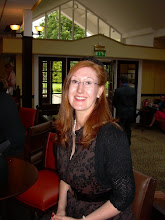At the moment, I'm going through the infamous mid-Ph.D. slump, when I'd rather do pretty much anything (including marking GCSE papers, and, apparently, updating my blog) than actually get on with my thesis. However, this is what my thesis is supposedly about:
Thesis title: Christina Rossetti and the Influence of Gothic
Director of Studies: Professor Fiona Robertson
My original title was "Representations of Pre-Raphaelitism in Criticism and Fiction", and I proposed to examine the myth-making process instigated by the Brotherhood themselves, and subsequently perpetuated by their biographers, who were often related to members of the group or had axes to grind. It became apparent early on in my research that such a study would not be manageable in the context of a Ph.D. Having reviewed recent secondary literature in the field of Pre-Raphaelite studies and the Rossettis, I concluded that there is increasing critical interest in Christina Rossetti's poetry, but that existing scholarship neglects the important influence of Tractarianism and Gothic literature on her work, and tends to ignore her both her early poems and also her later explicitly devotional poems. I thus decided to make Christina Rossetti the main focus of my research, since this is an area which touches on several developing trends in nineteenth-century studies, such as the increased attention paid to Victorian women poets and the "poetess tradition" since the mid-1990s, and the associated revival of interest in nineteenth-century religious culture, within which women played a central role.
Further research into Rossetti's poetry from her early poems, often dismissed as juvenilia, which refer to her reading of the Gothic novels of C R Maturin, and the apocalyptic prose of her last years, suggest a Gothic sensibility. Few critics have examined her early engagement with the Gothic, notably through the works of Maturin and Ann Radcliffe, and also through 'The Vampyre', a tale written by her uncle, John Polidari. Both her poetics and her subjects reflect this interest in Gothic literature, and my research will cover much new ground by considering Rossetti's poetry in terms of the Gothic, and exploring her use of the tropes of Gothic, such as fallen women, doubles and spectres.
My planned chapters are:
Christina Rossetti and Gothic Literature (Introduction and literature review)
The Maturin poems and the early influence of Gothic
‘Goblin Market’ and its multiple interpretations
Spectres and spectrality
Gothic and Rossetti’s devotional poems and prose
Gothic, Sing Song and children’s literature
 I'm delighted to say that the National Student Forum has launched our first annual report. This was presented to the Government by our chair last week, and we have been promised a formal response to the points we have raised about improving life for students in the UK.
I'm delighted to say that the National Student Forum has launched our first annual report. This was presented to the Government by our chair last week, and we have been promised a formal response to the points we have raised about improving life for students in the UK.










